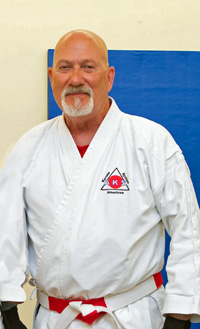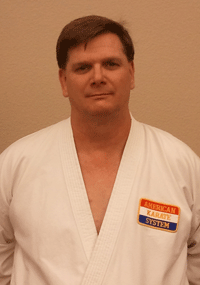AKS Quarterly Newsletter
March 2025
The Master's Edge
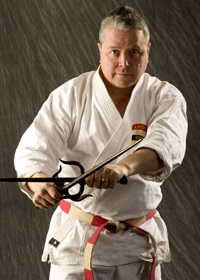
9th Dan
AKS Chief Instructor
Fred Reinecke, 9th Dan
AKS Chief Instructor
231-777-1996
Farphotofred.myportfolio.com
frederic-reinecke.pixels.com
Far Karate Facebook Page
You may also check our AKS Facebook Page for information.
The DoJo
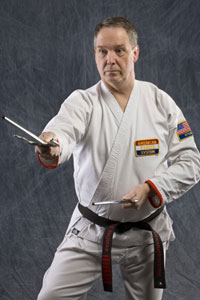
Why Belong to the American Karate System?
Dave Thomas
Over the years, I have been asked, "Why should I belong to the AKS? What's in it for me?"
There are number of great reasons to be a member of the American Karate System. Foremost is being a member of a credible martial arts style with a long and reputable history.
Mr. Lieb presented the concept of the American Karate System at a training summer camp in August 1973. Previously, he had taught for 10 years under the banner of American Chi Do Kwan.
By this time in his martial arts career, Mr. Lieb was a well-known and well respected martial artist throughout the United States. He was a long time national level competitor and tournament promoter. In 1973, he was honored to be Black Belt Magazine's Martial Artist/Man of the Year. Later in 1973, he was chosen to be the first A.A.U. Karate Chairman for the U.S. In 1978, he was recognized by "Who's Who" as the head of American Karate.
You can be judged by the company you keep. His long-time friends and fellow martial artists were also pioneers in American martial arts in their own right; such as Bruce Lee, Chuck Norris, Nick Cerio, Ed Parker, Ken Knudson, Jimmy Jones, John Tai, Tadashi Yamashita and Bill Wallace.
With his years of experince, Mr. Lieb established a strong foundation for his future instructors to build on.
His American Karate System was designed to be a departure from some of the hold-over practices from the Orient. This was America, Mr. Lieb wanted students and instructors to have a voice in the direction and growth of our system. But he also adhered to many of the philosophical tenets of the traditional systems; such as honor, respect, discipline and humility were an intregral part of our training.
Mr. Lieb maintained high standards and expectations for his Black Belts. As he traveled the country and later the world, he saw martial arts elements that he chose to incorporate into his new style. He also saw practices and behaviors that he would not allow on the floor.
His teaching format was strong basics, precise katas and powerful self-defense. He would not promote students to higher rank if they did not have sound self-defense skills. This was a mandate to his AKS instructors, no matter where the school was located. Often he would travel to out-of-state schools to oversee testing personally; to assure the students had the ability to more than represent their rank.
He always said, "You have to earn your rank before you can wear it."
These are values that his instructors still practice today.
Today the AKS is a small organization with schools in three states: Michigan, Ohio and West Virginia. But the same standards and practices that were put forth over 50 years ago are still taught today.
Our instructors' first obligation is to teach our students to the best of their knowledge and ability. We continue to assure that our students have the skills and abilities to properly support the rank they have earned.
The benefits of training in the American Karate System, to put it simply, are life changing. Students gain self-discipline, self-esteem and self confidence. I have seen so many positive changes from the students I have had the pleasure of training; academic improvement, vocational acomplishment, better personal relationships and a generally happier life.
They learn to handle fears, threats and personal set-backs. This includes not just the threat of physical violence, but having the confidence to achieve when no else believes in their dream.
From my own experience, I was having lunch with Mr.Lieb one day, he told me how proud he was that I had built a very successful business when many others forecast my failure. I told him that building my company was easy, because the hardest thing I had ever done was to earn my Black Belt. After that, I knew I could do anything I set my mind to. I told him, "You believed in me, before I believed in me. You saw something that I had yet to recognize. It gave me the confidence to succeed. That was all I needed."
Today and every day, I am so proud of the talented instructors that carry-on Mr. Lieb's legacy. They continue to put the best interests of the student foremost. We may not be the biggest, but we do represent the best of what martial arts has to offer.
Dave Thomas8th Dan AKS
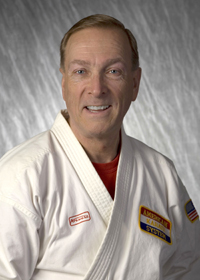
Chief Instructor Emeritus
Weapons
Necessity or Obsession?
Michael A. Sullenger
Chief Instructor - Emeritus
Respectively yours in Budo,
Mike Sullenger, 9th Dan
AKS Chief Instructor Emeritus
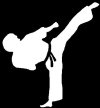
Black Belt Promotions

Fred Reinecke
9th Dan
Chief Instructor
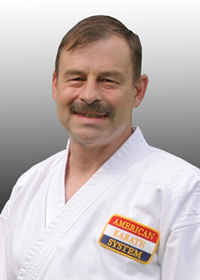
John Folsom
8th Dan
Chief Instructor
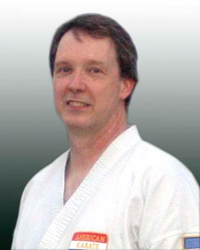
Dave Thomas
8th Dan
Chief Instructor
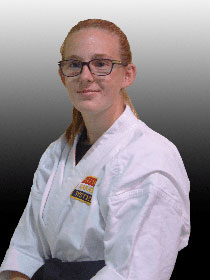
Sydney E. Brooks
2nd Dan
Chief Instructor
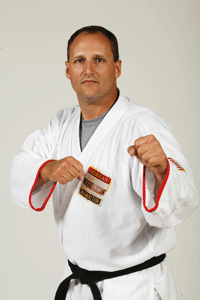
Andrew Eckhart
5th Dan
Chief Instructor
& Self-Defense Program
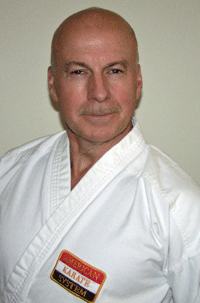
Mark Soderstrom
4th Dan
Chief Instructor
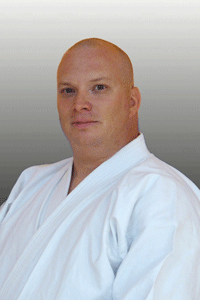
John Billie
2nd Dan
Chief Instructor
CONGRATULATIONS to all students who have been promoted this past quarter, and to those we've missed in prior newsletters.
Best wishes in your continued training!
Attention Instructors, if you have students who have been promoted, please send this information so that we may acknowledge their accomplishments.
In Memoriam - David Eric Thomas
On October 22, 2024, the American Karate System lost one of our sterling members. Mr. David Eric Thomas passed away from a stroke caused by an inoperable brain tumor.
David was always destined to be part of the AKS. I have been a long-time Black Belt with AKS, his mother, Shannon, was a talented brown belt, and his sister, Jennifer, worked her way up to green belt. Mr. Lieb bought David a size 000 gi when he was three months old. David started training at six years old with myself and Mr. Lieb. He took a couple year hiatus to sharpen his video game skills, but returned in earnest at age 15.
David Eric earned his Black Belt at 18. At six foot six inches tall, he was a formidable sparring opponent, but excelled at learning and teaching forms. He loved empty-hand as well as weapons forms. He soon began assisting at regional seminars in Ohio, West Virginia and Oklahoma; as well as helping teach during one of our trips to Germany.

David had his own club at the YMCA in Grand Haven, Michigan. He and Shawn Pike produced a number of training videos for AKS basics as well as grade rank and advanced forms. He wrote an AKS Instructor's Manual which is still in use today. He hosted karate demonstrations and taught free women's self-defense seminars. He was always very kinetic. He said, "Karate is something you do, not something you talk about." He was awarded the 2011 Black Belt-of-the-Year.
When he was in college, he signed up for the Tae Kwon Do class. He asked me if he should inform the instructor that he already held a Black Belt?
"What rank do you hold in Tae Kwon Do?" he was asked by the instructor.
"None" he answered.
"Then I wouldn't say anything, I replied. Go and train quietly, see what they have to offer."
It was a good plan. He was even complimented as a beginner on how quickly he learned techniques and forms. But his cover was blown the night Master Monte Begthol, the chief instructor for West Michigan TKD, came to class and walked up to David and gave him a big hug, and said how pleased he was to see him in class. The class instructors were shocked that their instructor would even know a beginner. Master Begthol had known David since birth and previously had him as a student in the college billiards class he taught for three semesters.
The friends that David made in class grew to include outside activities as well. There was a group of Black Belts that would meet weekly in Ed Baessler's basement for weight lifting and conditioning. He also encouraged several other Black Belts to come work with him as security staff (more commonly termed 'bouncers') at Kirby Grill in Grand Haven. David's best friends were all from the relationships he had made in karate.
Condolences have poured in from those he met around the country, as well as from our brothers in Germany. The members of the American Karate System have stepped up to support and assist our family during this time of loss.
David trained with dignity and decorum. He had a passion for karate and the people in it. He will be missed.
David Thomas, 8th Dan
It's Christmas Time, Again

Once again we come to another year-end. We had 366 days this year to figure out our personal "Christmas" spirit. The season seems hectic and rushed for some, lonely for others, and sad for yet a few. Our AKS family lost another family member when David Eric Thomas 4th Dan, passed away October 22nd. Let us be always mindful to say, "I'm sorry, I love you, or just give a hug." Today may be all we have.
Here are some inspirational Christmas quotes:
- Christmas is the day that holds all time together. — Alexander Smith
- Christmas is not a time nor a season, but a state of mind.
- Christmas is a season for kindling the fire for hospitality in the hall, the genial flame of charity in the heart
- Christmas is doing a little something extra for someone
- Christmas is not as much about opening our presents as opening our hearts
- Christmas is the spirit of giving without a thought of getting
- Christmas is forever, not for just one day. For loving, sharing, giving, are not to put away — Norman Wesley Brooks
- Remember, if Christmas isn't found in your heart, you won't find it under a tree — Charlotte Carpenter
- Christmas will always be as long as we stand heart to heart and hand in hand
- Love the giver more than the gift
- It is Christmas in the heart that puts Christmas in the air
For 2025, we wish you Peace in Your Heart, Comfort in your sorrows, and Joy to All.
Laura Werner
AKS Webmaster

✨2024 AKS Summer Camp 50th Anniversary
Summer Camp dates are TBD
Tournament News
No tournaments news reported this quarter.
Please contact Dave Thomas.
Do You Have Member News ?
Please send news (weddings, births, graduations, etc.) so that we may share with our members and friends. Accompanying pictures are most welcome!
If you have a concern, question or suggestion, please let us know and we will address it here in the Punchline.
Please send your information to the AKS Webmaster. We look forward to hearing from you!
Available Clubs and Schedules:
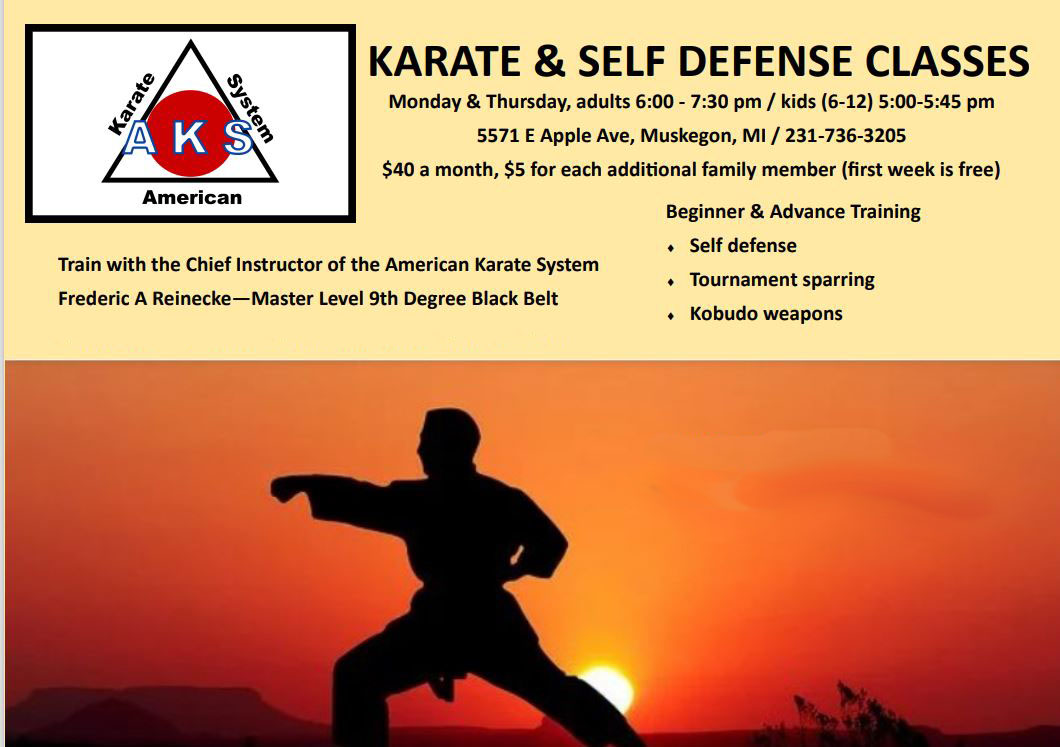
231-736-3205
Schedule a phone call and I'll get in touch
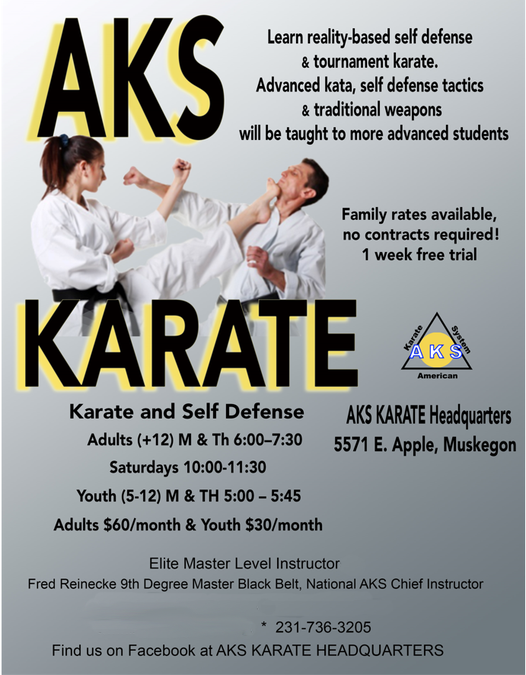
AKS Karate Muskegon
Cassel Training Center
AKS is conducting classes for AGES 8 + up at Cassell Training Center, 710 Alberta Street, Muskegon, MI.
Classes are Tuesdays & Fridays from 6:30p - 8:00p
Cost for individuals - $50.00 a month
Cost for family (immediate) - $75.00 a month
Chief Instructor - Dave Thomas, 8th Dan Black Belt AKS
Guest Instructor - Robert Essenberg, 3rd Dan AKS who was awarded 2009 Instructor of the Year by the Black Belt Hall of Fame
Assistant Instructors: Jim Roy 6th Dan AKS, Debra Roy 6th Dan AKS, Robert Roy 1st Dan AKS.
Call Dave for more information: 231-206-3279
Attention Club Instructors. Please send your club/class schedule to me so that I can include your class schedules here.
hello
Contact Info

Fred Reinecke
far.photo.fred@gmail.com
~
John Folsom (304) 782-3756
~
Jude Gore / Chairperson
jgore@citynet.net
~
Debra Roy
mr.mrsblackbelt@netzero.net
~
Andrew Eckhart
aeckhart77@gmail.com
~
Kristyn Reinecke
~
Mike Sullenger
kick2aks@yahoo.com
The AKS Executive Board is currently working on updating the AKS Student Handbook and The AKS Rules and Regulations. This also includes techniques and requirements. If you find errors in the handbook, please let us know. We would love to hear your ideas and suggestions to grow and improve the AKS.
A.K.S. FACEBOOK PAGES AT
AKS Facebook Fan Page
AKS Karate Headquarters FB
West Virginia AKS FB
AKS Facebook Group
You will need to have a FaceBook Login for the 'Group' link.Our Official Web Address:
www.aks-usa.comIn addition: www.aks-usa.org or www.aks-usa.net will direct you to our website as well.
You can type in www.aks-usa.info and you will be taken directly to our "About Us" web page. Please check us out!!
For Questions or CommentsMike Sullenger - Chief Instructor Emeritus
Se habla Español
AKS Webmaster










